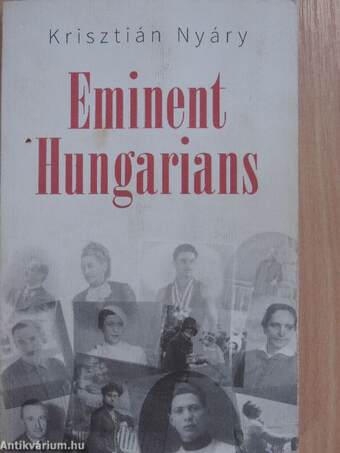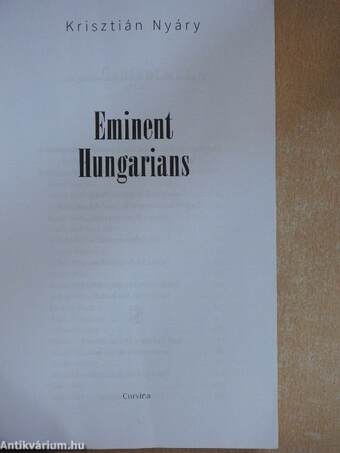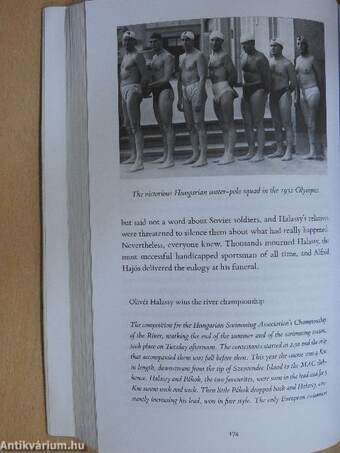1.077.035
kiadvánnyal nyújtjuk Magyarország legnagyobb antikvár könyv-kínálatát

VISSZA
A TETEJÉRE
JAVASLATOKÉszre-
vételek
Eminent Hungarians
| Kiadó: | Corvina Kiadó |
|---|---|
| Kiadás helye: | Budapest |
| Kiadás éve: | |
| Kötés típusa: | Ragasztott papírkötés |
| Oldalszám: | 355 oldal |
| Sorozatcím: | |
| Kötetszám: | |
| Nyelv: | Angol |
| Méret: | 21 cm x 14 cm |
| ISBN: | 978-963-13-6410-1 |
| Megjegyzés: | Fekete-fehér fotókkal. |
naponta értesítjük a beérkező friss
kiadványokról
naponta értesítjük a beérkező friss
kiadványokról
Előszó
Introduction
Seven out of every ten people are prepared to deliver a lethal electric shock to a person in a laboratory if they are given a sufficiently firm order. Seven out of ten are prepared... Tovább
Előszó
Introduction
Seven out of every ten people are prepared to deliver a lethal electric shock to a person in a laboratory if they are given a sufficiently firm order. Seven out of ten are prepared to humiliate their fellow man dressed as a prisoner - or to stand by and say nothing while someone else does g| merely because they are dressed as warders. As a result of the celebrated socio-psycho-logical experiments conducted by Stanley Milgram and Philip Zimbardo we can state the proportion of mankind that is prepared blindly to obey an evil order: seventy per cent. A series of sociologists have interpreted these experiments and attempted to understand why unquestioning obedience makes monsters of good people. Is it a desire to conform, peer pressure, fear or lack of self-confidence? It is certainly worthwhile devoting much thought to this question, but to me this is not what really matters. What interests me is the remainder, the thirty per cent. Those who venture to oppose the majority, who do the right thing even though they are in the minority. Who do not yield to that magnetic force that Zimbardo calls the Lucifer-effect: it seems devilish, but is very, very human.
My heroes have played important parts in the history of Hungary over the last two centuries. They have, however, not been military leaders, rulers or statesmen, but private individuals who have shaped the world around them. All the same, through what
7 Vissza
Fülszöveg
Krisztián Nyáry lectured on the history of poetry for several years at Pécs University, and although he resigned his lectureship in the mid-1990s the history of literature and culture remains his hobby. He has run a PR agency, a public opinion research institute, and has been communications director of a state organ; presently he is busy publishing books. In early 2012 he began to publish on Facebook - for his friends - sketches of the love-lives of Hungarian artists and writers, which rapidly attained great popularity. These jottings gave rise to two books entitled így szerettek ők 1-2 (Thus they loved), which became best-sellers. In his books Igazi hősök (Real Heroes) and Merész magyarok (Valiant Hungarians) of 2014 and 2015 respectively he has written about men and women whose lives, and determination set examples that remain valid to this day.,In his latest book he gives an account of the love relationships of Hungarian painters of the nineteenth and twentieth centuries.... Tovább
Fülszöveg
Krisztián Nyáry lectured on the history of poetry for several years at Pécs University, and although he resigned his lectureship in the mid-1990s the history of literature and culture remains his hobby. He has run a PR agency, a public opinion research institute, and has been communications director of a state organ; presently he is busy publishing books. In early 2012 he began to publish on Facebook - for his friends - sketches of the love-lives of Hungarian artists and writers, which rapidly attained great popularity. These jottings gave rise to two books entitled így szerettek ők 1-2 (Thus they loved), which became best-sellers. In his books Igazi hősök (Real Heroes) and Merész magyarok (Valiant Hungarians) of 2014 and 2015 respectively he has written about men and women whose lives, and determination set examples that remain valid to this day.,In his latest book he gives an account of the love relationships of Hungarian painters of the nineteenth and twentieth centuries.
Bernard Adams was born in 1937 in the Black Country. He was educated at King Edward's School, Birmingham, and Pembroke College, Cambridge, where he read Hungarian and Russian. After a spell as Fellow in Turkish at London University, he followed a career as a schoolmaster (mostly at Highgate School) until 1991. He then took early retirement in order to concentrate on the translation of Hungarian literature, eventually moving to Hungary in 2006.
György Cziffra, the pianist: the Secret Police made him break stone at Recsk so that he would not be able to play again.
Mihály Fadlallah el Hedad: he left Syria for Hungary, became an army officer and made the horse-farm at Bábolna the best in the world.
Olivér Halassy: the world's first Paralympian. By a superhuman achievement he won gold in water polo and the 1,500 metres on the same day.
Vilma Hugonnai, the first Hungarian woman doctor: she struggled for twenty years so that women could qualify as doctors in Hungary.
Sára Karig: for uncovering the communist deception in the elections of 1949 she served six and a half years in one of the harshest Soviet labour camps.
Áron Márton, bishop of Transylvania: he was exiled to Romania by the Hungarian authorities for denouncing the disenfranchisement of the Jews as unchristian and inhuman.
Menyhért Lakatos, a writer: permitted, though a Gypsy, to attend school, he was shot at and almost killed for someone's amusement.
László Papp, most successful'Hungarian boxer ever: he was prevented by decree of the communist party from competing for the professional world championship.
Simon Papp: the world's best oil explorer, he was sentenced to life imprisonment but from his prison cell discovered the most important oilfields in Hungary.
Imre Reviczky: by his humane treatment of them he saved the lives of 40,000 Jewish, Serbian and Ruthenian forced labourers, but ended his days delivering coal.
Ignác Semmelweis, the saviour of mothers: he clung so firmly to his beliefs that his medical colleagues and his family combined to put him in a lunatic asylum. Vissza
Tartalom
Contents
Introduction j
Blanka Teleki 13
Manó Gozsdu 25
Ábrahám Ganz 35
Lipót Löw 45
Ignác Semmelweis 57
Gudbrand Gregersen 67
Mihály Fadlallah el Hedad 81
Ármin Vámbéry 93
Vilma Hugonnai 105
László Rátz 115
Rózsa Bédy-Schwimmer 123
Róbert Feinsilber 135
Gedeon Richter r45
Attila Petschauer •••••
Olivér Halassy l67
Gábor Sztehlo r77
Margit Slachta i89
László Ocskay 201
Imre Reviczky 211
Géza Soos 225
Ilona Elek 235
László Kozma 245
Sára Karig 257
Simon Papp 269
Áron Márton 281
György Cziffra 293
László Papp 3°3
István Angyal 3*3
Menyhért Lakatos 323
BéniFerenczy 333
Notes 345
Picture Credits 347
Appendix 348
Témakörök
Megvásárolható példányok
Nincs megvásárolható példány
A könyv összes megrendelhető példánya elfogyott. Ha kívánja, előjegyezheti a könyvet, és amint a könyv egy újabb példánya elérhető lesz, értesítjük.







